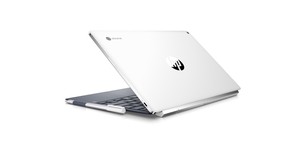Microsoft declares war on Chromebooks
July 15, 2014 | 11:16
Companies: #chrome #google #hewlett-packard #hp #microsoft

Microsoft has spoken of its desire to cut Google's Chromebooks off before they can threaten its market share of entry-level laptops, announcing partnerships with hardware manufacturers on a range of low-cost Windows-based alternatives.
Google's Chromebooks are an interesting concept: low-end laptop hardware with a small chunk of solid-state storage, the devices run a Linux-based Chrome OS which stores its files and applications in the cloud. Although they come with some support for offline use, Chromebooks are designed to be used with an internet connection - and it's that ability to offload storage and even processing to the cloud that allows them to punch well above their weight. Coupled with a user-friendly interface and the promise of no user interaction required for updates and patching, the systems are causing a stir in the entry level and educational markets.
That's a threat Microsoft cannot countenance, with the the result that the company has declared war on Chromebooks. Chief operating office Kevin Turner announced the opening salvo at a partner conference attended by The Verge: a low-cost entry-level laptop, dubbed a Stream PC, to be produced by HP and to retail for just $199 (around £146 excluding taxes.) This, he claimed, will be followed by versions with displays as small as 7" which will cost just $99 (around £58) - barely enough for a user to purchase a Windows licence, let alone the hardware on which to run it.
Calling Chromebooks out as the inspiration behind the move, Turner and his team highlighted the many ways in which a Windows-based device is superior. These, naturally, ranged from the ability to use almost all, rather than just some, applications offline and the greater variety in hardware to support for legacy applications and the de facto standard Microsoft Office suite.
The $199 HP Stream PC is expected to launch before the year is out, but no launch date has been provided for the smaller and cheaper variants.
Google's Chromebooks are an interesting concept: low-end laptop hardware with a small chunk of solid-state storage, the devices run a Linux-based Chrome OS which stores its files and applications in the cloud. Although they come with some support for offline use, Chromebooks are designed to be used with an internet connection - and it's that ability to offload storage and even processing to the cloud that allows them to punch well above their weight. Coupled with a user-friendly interface and the promise of no user interaction required for updates and patching, the systems are causing a stir in the entry level and educational markets.
That's a threat Microsoft cannot countenance, with the the result that the company has declared war on Chromebooks. Chief operating office Kevin Turner announced the opening salvo at a partner conference attended by The Verge: a low-cost entry-level laptop, dubbed a Stream PC, to be produced by HP and to retail for just $199 (around £146 excluding taxes.) This, he claimed, will be followed by versions with displays as small as 7" which will cost just $99 (around £58) - barely enough for a user to purchase a Windows licence, let alone the hardware on which to run it.
Calling Chromebooks out as the inspiration behind the move, Turner and his team highlighted the many ways in which a Windows-based device is superior. These, naturally, ranged from the ability to use almost all, rather than just some, applications offline and the greater variety in hardware to support for legacy applications and the de facto standard Microsoft Office suite.
The $199 HP Stream PC is expected to launch before the year is out, but no launch date has been provided for the smaller and cheaper variants.

MSI MPG Velox 100R Chassis Review
October 14 2021 | 15:04








Want to comment? Please log in.